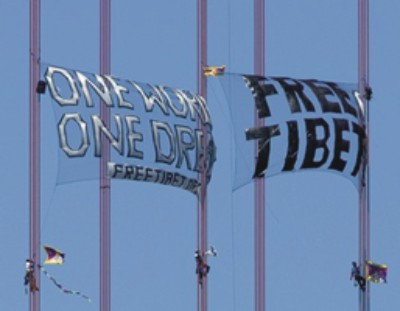Fact file
China: Leaders should not attend Olympics without rights improvements
World leaders should defer accepting invitations to the 2008 Summer Olympic Games in Beijing until the Chinese government makes key human rights improvements, Human Rights Watch said in an open letter today. In order to secure leaders' participation, the Chinese government should allow an independent international investigation into events in Tibetan areas since March 10, lift restrictions on the press nationwide, stop jailing dissidents, and increase pressure on Sudan.
To win its bid to host the 2008 Games, which open on August 8, the Chinese government made both broad commitments to improving its human rights record, and specific pledges to improve media access in advance of the Games. The participation by heads of state and government at the opening or closing ceremonies, which is crucially important to the Chinese government, remains a key point of leverage to press for positive changes in the coming months.
“If Beijing doesn't want to politicise the Games, why were an unprecedented 100 leaders invited to attend?” said Sophie Richardson, Asia advocacy director at Human Rights Watch. “Attendance has been turned into endorsement, and endorsement without significant progress in exchange is wrong.”

Since last December, Human Rights Watch has advised senior officials of the US and other governments that leaders should consider conditioning attendance at the opening ceremony on durable human rights improvements. (To read Human Rights Watch's letter to Secretary of State Condoleezza Rice, click here.)
Over the past two decades, the Chinese government has chronically restricted basic freedoms, including those of association, expression, and religious practice. Although Human Rights Watch recognizes some advances made during this period, the past three years have seen a steady deterioration of human rights: arrests of prominent civil rights activists, tightening restrictions on nongovernmental organizations, increasing internet censorship, and hardening policies towards ethics minorities, in particular in Tibet and Xinjiang.
Over the past year, Human Rights Watch has documented human rights abuses specifically as a result of Beijing's hosting the Games, including restrictions on media freedom, allowing abuses of migrant construction workers laboring on Beijing's new sports venues, subjecting those who criticize the Games to house arrest and prison on state subversion charges, and conducting sweeps to remove the poorest and most vulnerable groups from Beijing, including rural petitioners, among others. Since mid-March, the Chinese government has responded disproportionately to protests in Tibetan areas.
The Chinese government's disregard for human rights can also be seen in some aspects of its foreign policy. For example, although the Chinese government used its influence to press the Sudanese government to agree to a United Nations African Union peacekeeping force (UNAMID) in Darfur, it should press Sudan to allow full deployment of this force, end attacks on civilians in Darfur, and comply with its obligations under Security Council resolutions and international law.
“World leaders can no longer ignore the obvious: that the Chinese government, which craves international recognition, is not a medalist when it comes to fulfilling human rights commitments,” said Richardson. “Now is the moment to leverage that desire for recognition into real change on human rights.”
Human Rights Watch takes no position on a boycott of the Games, but believes that the Olympics are a unique and appropriate moment for world attention to focus on China's human rights record, and an important opportunity for China's government to make demonstrable improvements. In its letter, Human Rights Watch urged leaders to condition their attendance on the Chinese government doing the following:
Permitting an independent international investigation, ideally led by the United Nations High Commissioner for Human Rights, into the events in Tibetan areas since March 10. The investigation should focus on issues such as access to prisoners, excessive uses of force, extrajudicial executions, torture in custody, arbitrary detentions, the failure to distinguish between protesting, which is permitted under Chinese law, and rioting, and the violation of freedoms of speech assembly, association, and religion. The findings of this investigation must be made public prior to the opening of the Games.
Reopening Tibetan areas to the international media as part of its commitment to media freedom in the run-up to the Olympics, making those freedoms permanent, and extending them to Chinese journalists. The recent government-controlled tours by members of the foreign media should not be considered evidence of real media freedom. Indeed, participants on that tour commented that their movements were strictly monitored and their reporting freedom was limited by their government minders.
Ceasing the practice of silencing peaceful government critics or protestors through extrajudicial measures such as house arrest or actual prosecution on grounds of subverting the state, a charge that carries a five-year sentence. The activists Hu Jia and Yang Chunlin were recently sentenced on these charges to three-and-a half and five years, respectively, for their public support of human rights and criticism of the government.
Publicly calling on the Sudanese government to immediately cease attacks on civilians in West Darfur by Sudanese Armed Forces and allied militia, and to actively facilitate the speedy and unhindered deployment of UNAMID at all levels. If the government of Sudan fails to comply, China should then support the imposition of targeted sanctions on senior government officials by the UN Security Council.
“Leaders need to decide whether now is the moment to say they will stand arm-in-arm with the Chinese leadership at its 'coming out' party,” said Richardson. “The onus will be on those who plan to attend to explain why they think it is appropriate to do so.”
Source: Human Rights Watch.